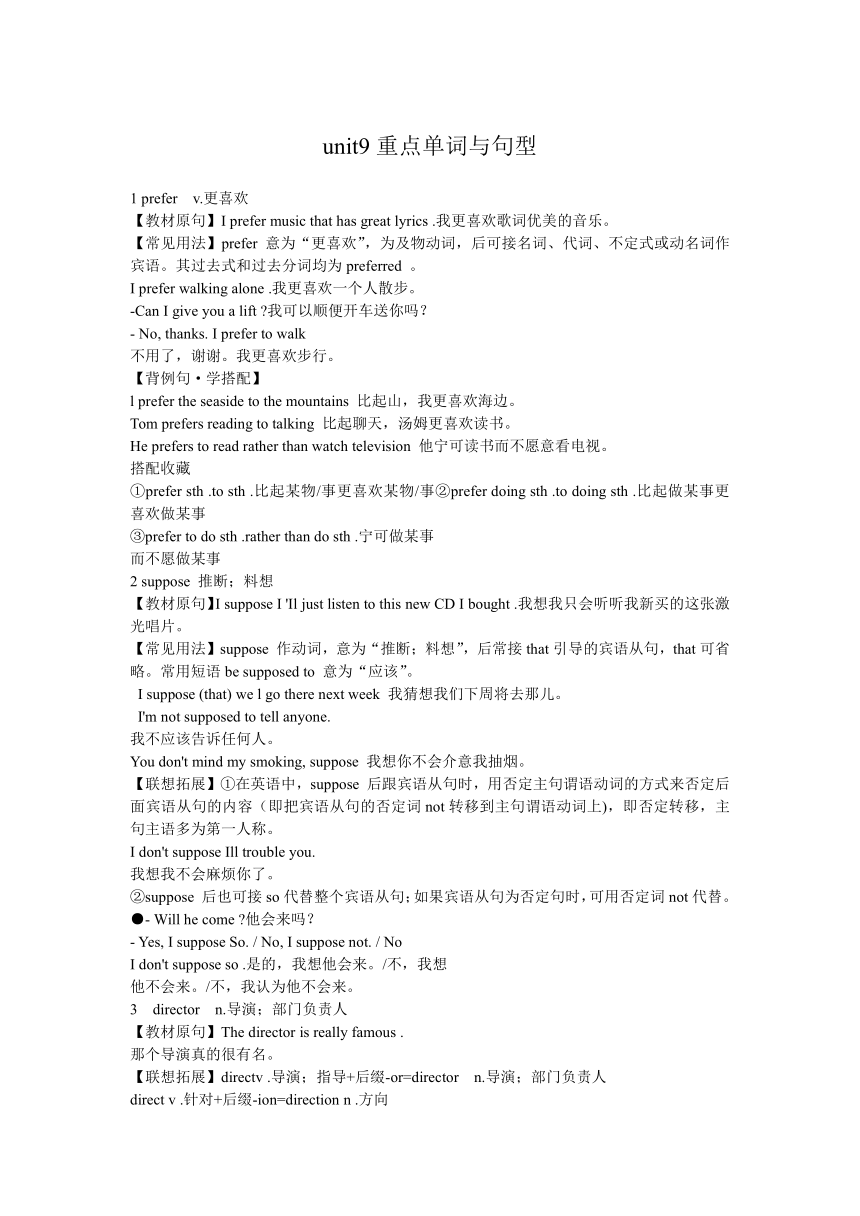
unit9重点单词与句型 1 prefer v.更喜欢 【教材原句】I prefer music that has great lyrics .我更喜欢歌词优美的音乐。 【常见用法】prefer 意为“更喜欢”,为及物动词,后可接名词、代词、不定式或动名词作宾语。其过去式和过去分词均为preferred 。 I prefer walking alone .我更喜欢一个人散步。 -Can I give you a lift 我可以顺便开车送你吗? - No, thanks. I prefer to walk 不用了,谢谢。我更喜欢步行。 【背例句·学搭配】 l prefer the seaside to the mountains 比起山,我更喜欢海边。 Tom prefers reading to talking 比起聊天,汤姆更喜欢读书。 He prefers to read rather than watch television 他宁可读书而不愿意看电视。 搭配收藏 ①prefer sth .to sth .比起某物/事更喜欢某物/事②prefer doing sth .to doing sth .比起做某事更喜欢做某事 ③prefer to do sth .rather than do sth .宁可做某事 而不愿做某事 2 suppose 推断;料想 【教材原句】I suppose I 'Il just listen to this new CD I bought .我想我只会听听我新买的这张激光唱片。 【常见用法】suppose 作动词,意为“推断;料想”,后常接that引导的宾语从句,that可省略。常用短语be supposed to 意为“应该”。 I suppose (that) we l go there next week 我猜想我们下周将去那儿。 I'm not supposed to tell anyone. 我不应该告诉任何人。 You don't mind my smoking, suppose 我想你不会介意我抽烟。 【联想拓展】①在英语中,suppose 后跟宾语从句时,用否定主句谓语动词的方式来否定后面宾语从句的内容(即把宾语从句的否定词not转移到主句谓语动词上),即否定转移,主句主语多为第一人称。 I don't suppose Ill trouble you. 我想我不会麻烦你了。 ②suppose 后也可接so代替整个宾语从句;如果宾语从句为否定句时,可用否定词not代替。 ●- Will he come 他会来吗? - Yes, I suppose So. / No, I suppose not. / No I don't suppose so .是的,我想他会来。/不,我想 他不会来。/不,我认为他不会来。 3 director n.导演;部门负责人 【教材原句】The director is really famous . 那个导演真的很有名。 【联想拓展】directv .导演;指导+后缀-or=director n.导演;部门负责人 direct v .针对+后缀-ion=direction n .方向 4 stick v .粘贴;将……刺入 【教材原句】While some people stick to only one怎么回事?粘不住。 Don't stick pins into the chair!别把针插入椅子里! He stuck the knife right into the butter 他刚好把刀子插入黄油之中。 Don’t keep changing your friends, get a few good friends and stick to them .不要老是换朋友,交几个好朋友然后忠实于他们。 5 plenty of 大量;充足 【教材原句】Documentaries like March of the Penguins which provide plenty of information about a certain subject can be interesting …像《帝企鹅日记》这样提供了有关某一话题的大量信息的纪录片可能很有趣…… 【易混辨析】many, much, a lot of ,lots of 与plenty of的用法区别 易混词 后接名词情况 句式 many 可数名词复数 用于肯定句、否定句和疑问句 much 不可数名词 用于肯定句、否定句和疑问句 a lot of 可数名词复数和不可数名词 常用于肯定句 lots of 可数名词复数和不可数名词 常用于肯定句 plenty of 可数名词复数和不可数名词 常用于肯定句 Are there many students in his class? 他的班上有很多学生吗? We don’t have much work to do 我们没有太多工作要做。 There are a lot of books in the library 图书馆里有许多书。 There is lots of time to spare .时间绰绰有余。 I need plenty of time ... ...
~~ 您好,已阅读到文档的结尾了 ~~